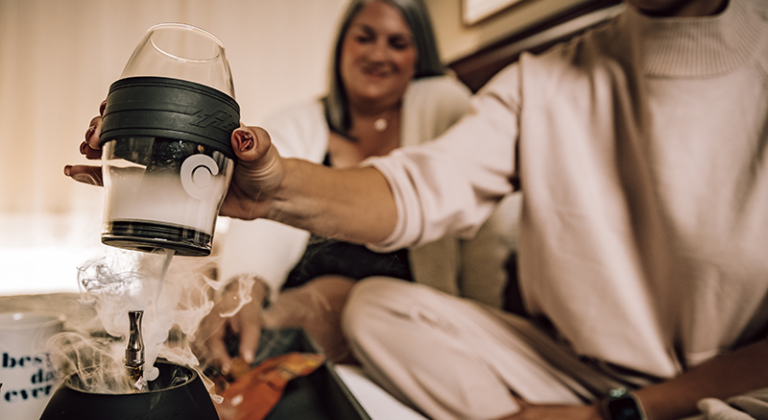As society’s perception of cannabis continues to evolve, many older adults are curious about its potential benefits for wellness and health. If you’re among those who are intrigued but cautious, you’re not alone. Navigating the world of cannabis can feel overwhelming, especially when faced with conflicting information and misconceptions. But fear not—this guide is here to provide you with the knowledge and confidence to explore cannabis as a wellness option.
The Conversation Around Cannabis Has Changed
Before we delve into the intricacies of cannabis, it’s essential to recognize the unique perspective of older adults. Many grew up during a time when cannabis was widely stigmatized and illegal. As such, it’s natural to approach the topic with caution and skepticism. However, times have changed, and so has our understanding of cannabis.
As more research is published about its potential health and wellness benefits along with general recreation, more people are considering cannabis than ever before. For many older adults interested in cannabis, it may start with its therapeutic benefits.

Cannabis for Health and Wellness
One of the most compelling aspects of cannabis for older adults is its potential health and wellness benefits. While research is still ongoing, preliminary studies suggest that cannabis may offer relief for a variety of health conditions, including chronic pain, insomnia, anxiety, and certain medical conditions like arthritis and multiple sclerosis.
It’s important to note that these studies are not conclusive, and more research is needed to fully understand the therapeutic potential of cannabis. However, many individuals have reported significant improvements in their symptoms after incorporating cannabis into their wellness routine.
Safer Than Ever, But Only in Some States
Before you consider using cannabis, it’s crucial to understand the safety and legal considerations. Cannabis use can carry certain risks, including cognitive impairment (feeling high), dependence, and interactions with medications. Additionally, the legal status of cannabis varies depending on your location, so it’s essential to familiarize yourself with the laws and regulations in your area.
More than half of the United States has legalized cannabis in some form, whether recreationally, medically, or both. While several states still prohibit cannabis completely, it is more accessible to legally purchase safe, tested cannabis than ever before.
Different Cannabis Consumption Methods
Cannabis can be consumed in various forms, each with its own set of benefits and considerations. Smoking and vaping offer fast-acting relief, however some may not prefer inhalation for its potential respiratory harm. Edibles provide a discreet and long-lasting effect but require careful dosing to avoid overconsumption. Luckily with proper education, this can be prevented before it ever occurs.
Tinctures and topicals offer targeted relief without the psychoactive effects commonly associated with cannabis. This includes CBD products as well, which have been touted by many for their potential therapeutic benefits. However studies on the benefits of THC, CBD and other cannabinoids are still inconclusive. By exploring different consumption methods, it is possible to find the option that best suits your needs and preferences.

Start Low and Go Slow
Whether you’re new to cannabis or returning after a long hiatus, it’s crucial to start with a low dose and gradually increase as needed. This approach, known as “start low and go slow,” allows you to gauge your response to cannabis and minimize the risk of adverse effects. Remember, everyone’s tolerance and sensitivity to cannabis are different, so listen to your body and adjust accordingly.
It is very common for a legal dispensary to carry edible products that contain 10mg of THC per serving, or 100mg per package. While 10mg may be the standard dose, it is not recommended for first time consumers. Some cannabis gummy products may come with a perforated line allowing it to be split into smaller doses.
Dispelling Myths and Misconceptions
Despite the growing acceptance of cannabis, myths and misconceptions are all too common. It’s essential to separate fact from fiction and approach cannabis with an open mind.
Contrary to popular belief, cannabis is not a gateway drug, and research supports that it may not be inherently addictive. While it’s true that cannabis can impair cognitive function, especially in high doses, these effects are typically mild and temporary.
Cannabis has not only created a multi-billion dollar industry that employs thousands of people, its potential benefits have been more available to study for yourself and see if it is right for you.
Personal Testimonials and Case Studies
Perhaps the most compelling evidence of cannabis’s potential benefits comes from the firsthand experiences of individuals who have incorporated it into their wellness routine. Many older adults have reported significant improvements in their quality of life after using cannabis for pain relief, sleep management, and stress reduction. It is more likely than ever that you might know someone personally who uses cannabis medically or recreationally.
While personal testimonials are valuable, it’s essential to remember that individual experiences may vary, and more research is needed to fully understand the therapeutic effects of cannabis.
Community Resources and Support
If you’re considering using cannabis, it’s essential to seek guidance from knowledgeable professionals and support groups. As the taboo surrounding cannabis has slowly started to fade, many healthcare providers now specialize in cannabis education and can provide personalized recommendations based on your health needs and goals.
Whether it is a community group with a focus on cannabis or exploring the plant and its potential benefits through your own research, learning about cannabis and connecting with others through it can be highly beneficial.
Only You Know if Cannabis is For You
As you embark on your journey with cannabis, remember that knowledge is power. By arming yourself with accurate information and approaching cannabis with an open mind, you can make informed decisions that support your health and well-being.
Depending on what you hope to gain from trying a new substance, cannabis may offer a natural and effective solution. Embrace the opportunity to explore new potential wellness options and discover what works best for you.

